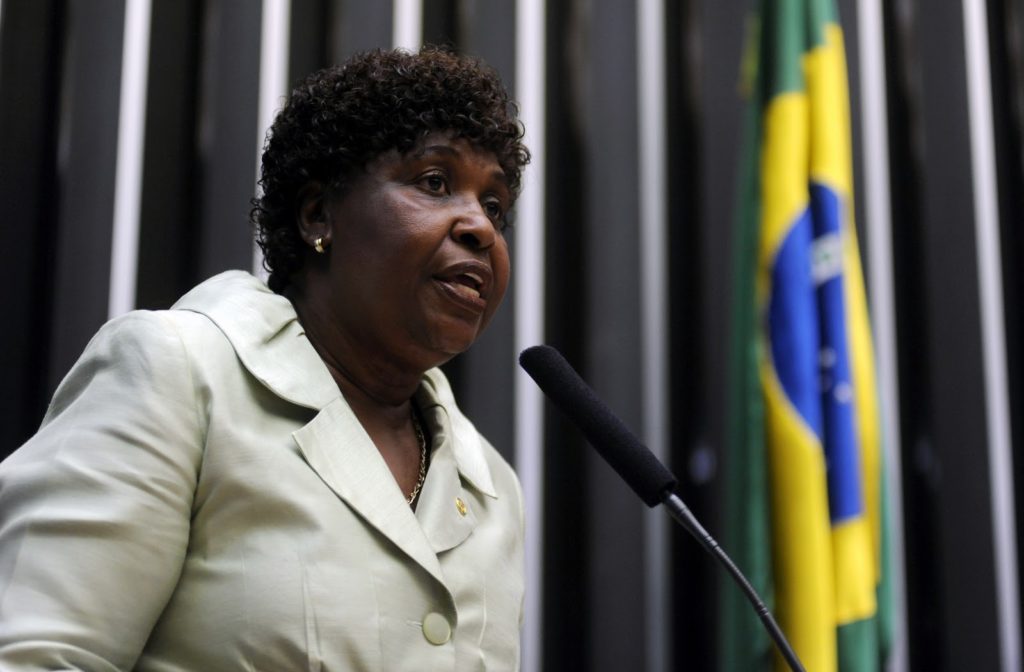RIO DE JANEIRO, BRAZIL – The Superior Electoral Court (TSE) ruled on Tuesday, August 25th, by six votes to one, that the sharing of campaign financing and political campaign advertising time on radio and TV should be proportionately split between black and white election candidates.
The judges reached the decision after examining a consultation submitted by federal Deputy Benedita da Silva (PT-RJ) and representatives of the black movement. Also by majority decision, the rule will only apply after the 2022 elections.
At the end of the hearing, TSE Chief Judge Luis Roberto Barroso said that the decision was “very important” for the life of the court and for the country itself.

“There are moments in life when everyone needs to choose on which side of history they want to be. Today, we declare that we stand beside those who fight racism, besides those who want to write the history of Brazil with inks of all colors,” he said.
“With some delay, but not too late, we are moving the history of Brazil towards racial justice,” added the TSE Chief.
Five electoral judges joined Barroso’s vote in favor of proportionality: Edson Fachin, Alexandre de Moraes, Og Fernandes, Luís Felipe Salomão and Sérgio Banhos.
Judge Tarcísio Vieira dissented. In his vote, he emphasized the significance of the discussion but pointed out that there are projects under way in the Chamber of Deputies that provide for proportional distribution between black and white candidates.
During the discussion on when the rule should start to apply, Judges Og Fernandes, Luís Felipe Salomão, Tarcísio Vieira and Sérgio Banhos voted for early 2022.
Luís Roberto Barroso, Edson Fachin, and Alexandre de Moraes considered it possible to enforce the rule as early as 2020. Moraes advocated a transition rule, which would consider the number of black candidates a party presented in the 2016 elections.
Opinions of the Judges
Below is an overview of the opinions given on Tuesday:
Og Fernandes: “Denying the black population equal conditions of access to the resources in the Partisan Fund and the right to airtime is hindering plural democratic participation in its entirety.”
Luís Felipe Salomão: “Racism in our country is manifested in the most diverse forms and environments, for reasons that go back to historical and structural aspects, either directly or implicitly. It has such a wide range that it has taken root in the private as well as in the public sphere, to the extent that racist practices are materialized not only in expressly discriminatory or offensive deeds, but also in government policies, acts and plans that somehow exclude or reduce, by actions or omissions, the access of a certain class, race or ethnicity to basic rights of any human being.”
Tarcísio Vieira: “It is imperative to advance and implement measures that reflect respect for diversity, pluralism, subjectivity, and individuality as expressions of the supreme postulate of human dignity. […] Nevertheless, in order to address the sensitive concerns raised for consideration, I believe that the issue, stripped of its own legislation, is very well entrusted to the high political discretion of the National Congress, given the claimant’s sound initiative and that of other legislators.”
Sergio Banhos: “At a time when I think that the legislative power is the appropriate place, a plural and democratic space to debate and create the Law, I also easily understand that, in the present times, the Judiciary is also entrusted with the task of properly enforcing the Law in a very restricted, minimalist form, with the solemn purpose and inherent to its role of ensuring fundamental rights.”
Prior votes
The TSE judges began to examine the issue in late June this year. At the start of the trial, on June 30th, case rapporteur Luís Roberto Barroso voted in favor of proportionality of distribution according to the candidacy of blacks and whites.
“If racism in Brazil is structural, it is necessary to act on the operation of social rules and institutions, in order to prevent them from reproducing and deepening racial inequality,” the judge said at the time.
Edson Fachin was in line with the rapporteur’s vote during the session. “Recognizing the pressing need to remove the obstruction of access by the black population to areas of power, to public and private institutions, is a necessary measure,” he said.
Last Thursday, August 20th, judge Alexandre de Moraes cast the third vote in favor of proportionality. “I have no doubt that the under-representation of black people in elective offices, while deriving from structural racism in Brazil, becomes one of the main instruments for the continuation of the very grave social inequality between whites and blacks,” he said.
Source: G1

